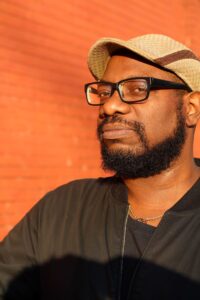Black Heritage in Horror: Interview with Kirk A. Johnson


Born in Trinidad in 1971, he credits his love for Sword & Sorcery and Heroic Fantasy from watching old movies with his dad. The very first novel he read was The Hobbit at age 8, and is an avid fan of Conan the Barbarian Marvel comic series.
In 2005, he began writing his own fantasy adventure short stories, and in 2014, he sold his first short story to MVmedia LLC for its first anthology Griots: A Sword and Soul Anthology. In 2022 he released The Obanaax and Other Tales of Heroes and Horrors. His very first collection of short stories loosely influenced by the cultures of West Africa and the Sahel.
What inspired you to start writing?
When I first read Charles Saunders Imaro. Though it wasn’t a horror novel, it had the elements of horror that electrified my imagination. It was that and the setting of the novel’s secondary world based/influenced by ancient and medieval African cultures and ethnic groups. So, you have a mixture of Ancient Africa, heroic fantasy, and horror. I saw that I could be a part of that. It became a concrete—tangible—thing for me to pursue instead of a fantastical world to daydream about.
What was it about the horror genre that drew you to it?
The horror subgenre that really gripped me was cosmic horror. The short stories of H.P. Lovecraft and Arthur Machen’s the Great God Pan. The idea of entities that were not only intelligent but are so immense that they were inconceivable as far as human imagination would allow. The horror, is the discovery that there are things that have absolute power over you and the world and has no love or concern for your well-being. Beings that see you as cattle—provender.
Do you make a conscious effort to include African diaspora characters and themes in your writing and if so, what do you want to portray?
I absolutely make a conscious effort to include such characters and themes. I want to portray how incredibly diverse the concerns, themes, and realities that make up the African diaspora are. I find so much joy in creating stories using the cultures and peoples of the diaspora. Especially the people I’ve grown up with, which included all types of “respectable” and “nefarious” characters.
What has writing horror taught you about the world and yourself?
It has taught me that the world, as a concept, is an everchanging place were balance and imbalance are in flux. It’s the normal state of things. The strange and the normal share positions, and we as humans conceive what is normal for the sake of sanity, labeling the strange as anomalies as opposed to being a part of our world.
How have you seen the horror genre change over the years? And how do you think it will continue to evolve?
There are definitely more diverse voices being added and celebrated within the genre. And with those new ideas and themes, we can fully explore what is horrifying to us, as individuals and as a community.
I don’t know how it will evolve. I just hope I live long enough to see a few more transitional phases.
How do you feel the Black community has been represented thus far in the genre and what hopes do you have for representation in the genre going forward?
Thus far, I’m excited to see more. In my mind, representation is one of the most undervalued yet essential aspects of the media landscape. Literature, film, music, etc., is how we learn to process emotions and ideas. It’s how we explore our ideas of what we value as individuals and groups. I hope that we—as people of the African diaspora—give ourselves the freedom to go far and beyond the fear of what society deems useful or acceptable. Break out! Strike out! And face the void.
Who are some of your favorite Black characters in horror?
To be honest, there are too many. But the more notable ones are Black Tom from The Ballad of Black Tom, Christian Brookwater from the Brookwater’s Curse series, Grandmother Zenobia Julio from Gypsy Kisses and Voodoo Wishes, and Sadie from Ring Shout.
Who are some African diaspora horror authors you recommend our audience check out?
Victor LaValle. Denise Tapscott, Steven Van Patton, P. Djeli Clarke (his book Ring Shout is more horror than his other works, and it’s incredible), Marc L. Abbott, L. Marie Wood, Zin E. Rocklyn, Eden Royce, and Terence Taylor.
What is one piece of advice you would give horror authors today?
Don’t be afraid to push the limits of your imagination. Dive into the abyss.
And to the Black writers out there who are just getting started, what advice would you give them?
Write what gets the blood pumping. Don’t be afraid to write whatever strange, weird, wacky, or gory thing you love. The African Diaspora is a diverse, growing, and hungry entity that is meant to thrive. There is an audience for you. So, write what you love. It will show in your work.



